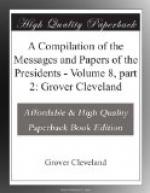It is not, however, to be forgotten that the best and surest guaranty of the primary rights of citizenship is to be found in that capacity for self-protection which can belong only to a people whose right to universal suffrage is supported by universal education. The means at the command of the local and State authorities are in many cases wholly inadequate to furnish free instruction to all who need it. This is especially true where before emancipation the education of the people was neglected or prevented, in the interest of slavery. Firmly convinced that the subject of popular education deserves the earnest attention of the people of the whole country, with a view to wise and comprehensive action by the Government of the United States, I respectfully recommend that Congress, by suitable legislation and with proper safeguards, supplement the local educational funds in the several States where the grave duties and responsibilities of citizenship have been devolved on uneducated people by devoting to the purpose grants of the public lands and, if necessary, by appropriations from the Treasury of the United States. Whatever Government can fairly do to promote free popular education ought to be done. Wherever general education is found, peace, virtue, and social order prevail and civil and religious liberty are secure.
In my former annual messages I have asked the attention of Congress to the urgent necessity of a reformation of the civil-service system of the Government. My views concerning the dangers of patronage, or appointments for personal or partisan considerations, have been strengthened by my observation and experience in the Executive office, and I believe these dangers threaten the stability of the Government. Abuses so serious in their nature can not be permanently tolerated. They tend to become more alarming with the enlargement of administrative service, as the growth of the country in population increases the number of officers and placemen employed.
The reasons are imperative for the adoption of fixed rules for the regulation of appointments, promotions, and removals, establishing a uniform method having exclusively in view in every instance the attainment of the best qualifications for the position in question. Such a method alone is consistent with the equal rights of all citizens and the most economical and efficient administration of the public business.
Competitive examinations in aid of impartial appointments and promotions have been conducted for some years past in several of the Executive Departments, and by my direction this system has been adopted in the custom-houses and post-offices of the larger cities of the country. In the city of New York over 2,000 positions in the civil service have been subject in their appointments and tenure of place to the operation of published rules for this purpose during the past two years. The results of these practical trials have been very satisfactory, and have confirmed my




